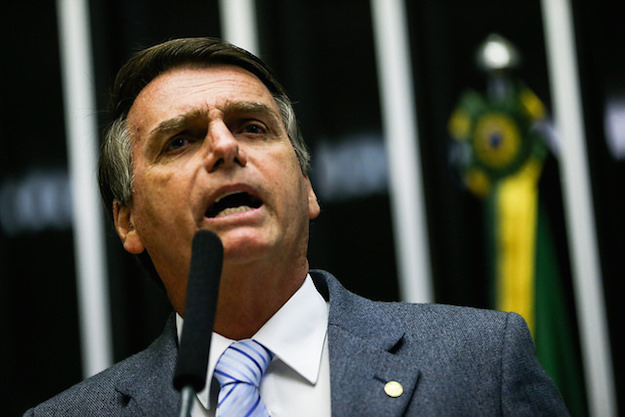Everywhere you go in Brazil, it’s the same thing.
Circles under the eyes, hushed voices. A shrug. “Fazer o que?”
In the bakeries of Eastern São Paulo. In courtrooms. In President Michel Temer’s government. Outside shuttered storefronts. At City Hall. In the 50-person line for jobs at a yogurt shop. In corporate suites.
The anger is gone.
These days, Brazilians are just tired.
Of the recession that won’t end, of the corruption scandals that won’t either, of politicians who offer no vision or hope for anything different.
With one big exception. But let me come back to that.
What changed? I was in Brazil this week for the first time since revelations emerged in May of graft at meat company JBS – culminating a few weeks ago in formal corruption charges against President Temer. His government hangs in the balance – a vote by two-thirds of Congress would effectively push him out. In this climate, you might expect to see a repeat of protests that erupted in 2013, or in 2016 to demand Dilma Rousseff’s impeachment. A push to get another rotten government out the door.
But there’s nothing like that. I see two main reasons.
First, the economy. It’s lousy, but with nuance. There’s a prevailing view that the JBS scandal killed any hope for a meaningful recovery – or Temer’s pro-business reform agenda. “Everybody threw up their hands and said ‘There went two years,’” one investor told me. On the other hand, prices have stopped rising – there was actually deflation in June, for the first time in a decade. There’s an old theory that inflation, not recession, is what really drives social unrest in Brazil. Meanwhile, though unemployment remains appallingly high at 13.7 percent, the first half of the year saw net job creation – barely – for the first time since 2014.
The other reason has to do with narratives – the stories we tell ourselves. A year ago, many Brazilians saw the fight to oust Rousseff as a battle of good versus evil. Now, she’s gone – but the economy is still stuck, and the stench of corruption has spread to not only Temer but virtually the entire political class. So who do you get mad at? Temer sucks, but who’s better? What’s the point?
I’ll quote Nilson, 42, a carpenter eating a pão na chapa in Mooca, a working-class area of São Paulo: “Those politicians are the same, they’re crooks, all of them.” But some have gone to prison, isn’t that good? “Ah, it doesn’t matter, they go to jail for a year and they still come out millionaires.” Does it make you want to protest? “So they can put another corrupt one in? You’re crazy. And protesters break things. Quem paga isso é a gente. We end up paying for that.”
Temer, that wily survivalist, is using all this to his advantage – and he may yet escape.
During his initial months, Temer tip-toed around anything that might put Brazilians back on the streets. No longer. When he looked set to lose a congressional committee vote last week, he simply stacked the committee with allies. He then steered some $5 billion in pork to friends to guarantee their support – at a time of severe budget cuts for schools, hospitals and oh, by the way, the federal police agents who investigate corruption cases. The consensus in Brasília is that Temer will survive the first set of charges against him – and then face a second wave, at which point it’s a coin flip. If he’s still president in September, he’ll probably finish his term.
Maybe all this is the calm before the storm. Everyone knows the real fight is for October 2018, when a presidential election offers a chance to finally turn the page. But even here, the picture is surprisingly muddled. I spent most of my trip in São Paulo, and expected to find fervor for its mayor, João Doria – but repeatedly heard, from people who know, that he may not even be his party’s candidate. Elsewhere: What about Marina Silva? Luiz Inácio Lula da Silva? Joaquim Barbosa? You can find supporters for each. But few seem excited.
Which, finally, brings us back to the exception.
In this (southern) winter of Brazil’s discontent, there is only one politician who is being mobbed at airports, whose supporters speak with an almost religious fervor and conviction. He is Jair Bolsonaro (pictured above), 62, a congressman and former army captain currently running second or third in most polls for president. His message: that civilian politicians are corrupt, that crime is out of control, that only nationalism and strict law-and-order can save the country.
Many insist Bolsonaro’s views are too extreme for Brazil. They cite his support for beating gay children, for torturing leftists, or his 2014 comment to a fellow legislator on the floor of Congress that “I won’t rape you because you don’t deserve it.” Bolsonaro manages roughly 16 percent in polls for the presidency – surely he couldn’t muster the 50 percent plus one required to win a runoff? But that 16 percent is double what it was in December. Support for democracy is at all-time lows; a June poll showed the armed forces are now Brazil’s most respected institution. Bolsonaro is running first among Brazil’s wealthiest and most educated voters, and he has 4.4 million followers on Facebook – 1.5 million more than Lula, Marina Silva or Doria (and 10 times more than Temer).
I know what you’re thinking, and Eliane Cantanhede, a prominent columnist for Estado de S.Paulo, wrote it this week: “The American press didn’t see Trump, ridiculed Trump, and then was finally obliged to swallow his victory … The risk is that we’ll all be surprised again.”
Apathy and fatigue? They never last for long.









